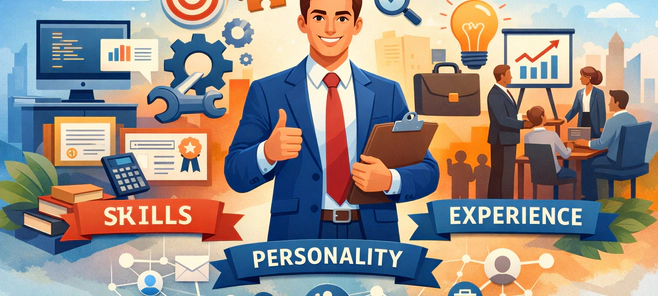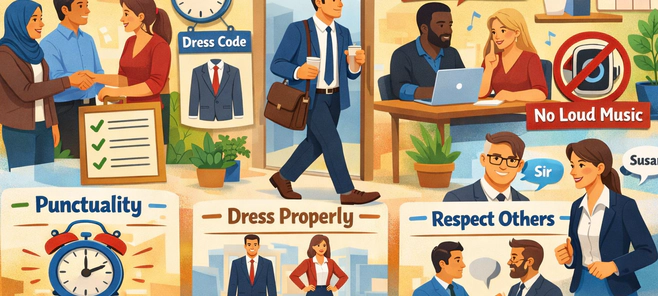Professional Development
A professional development plan is essential if you want to grow beyond the same role, same recognition, and same outcomes year after year.
Profession is where you work and put your effort for earning, recognition, self-satisfaction, and many other things. All these words are part of a continuous process. If you get a job and start earning, are you satisfied waking up to the same morning after five years? It’s like using a phone. You work hard, but over time, you won’t expect the same level of recognition. You’ll expect more or feel you deserve more. So, you want growth.
Is it possible to get your expected outcomes with the same effort, same tasks, same procedure? No. You have to improve your input for better output. In short, you have to focus on professional development for your earning, recognition, satisfaction, and growth.
Profession and Professional Development
Profession and development are connected. Some people think that yearly increments and promotions are indicators of development. But no, it is more than that. It means you are developing the procedures, the techniques, and the approach day by day with the changing demand.
It means you will skill up. You will update yourself by gathering knowledge and aligning with technology.
What Is a Professional Development Plan?
A professional development plan is a structured roadmap that helps you set goals, improve your skills, and achieve career milestones. It includes self-analysis, industry research, skill categorization, and action planning to grow professionally and align with your ambitions.
Professional Development - How It Looks?
Most professionals know the importance of professional development, but they don’t know how it actually looks. Let’s explore with an example:
You joined as a waiter in a restaurant. You received just two days of training and started serving people. In training, you learned a lot of techniques to serve the plate, the glass, the different types of steaks, spoons, or forks.
In the beginning, you forgot some rules or techniques, or you wanted to implement them, but did not properly. Day by day, you thought about this, and you practiced this. So, you skill up your procedure.
Now, if you’re doing the same after five or ten years with the same position, same work, is it right?
No, my friend. You have to develop. So, how can you develop?
You can do a basic course. You can learn the background of food service. You can learn about different types of cultures, multi-cuisine history, and hygiene training. This knowledge will help you do better.
Besides this, it will help you to become a senior waiter. Day by day, you can take a hotel management degree, a customer management course, or sales training. It will help you to get promoted with your practical experience.
So, you didn’t stay in one procedure, one designation, or the same tasks. You improved yourself with practical experience and professional degrees. This is called professional development.
In the same way, in an informal work culture, you have to gather practical experience, complete daily tasks, and meet yearly goals.
Besides that, you have to skill up yourself with a professional degree. It can be a diploma course, a specialist course, or even a doctorate.
Acquiring degrees and increasing practical experience is not just a usual process. It has to be planned, it needs a timeframe, and it must have a checklist. Hopefully, step by step, things will become clearer.
Self-Development and Professional Development
A lot of people think that professional development means self-development. Yes, it is a form of self-development, but not all kinds of self-development are professional development.
Any self-development that doesn’t directly reflect value in your profession cannot be called professional development.
Suppose you’re planning to lose 5 to 10 kg. It’s your personal development, health development, or a big achievement in self-development. Yes, it will affect your work life, but it doesn’t add any techniques, any procedures, or any new concepts to your daily tasks or work.
So, we have to plan specific and target-oriented development that will impact our professional life.
Different Types of Professional Development Courses and Methods
It may seem that professional development is a very complex process. No, it’s not. There are lots of sectors in professional development. You can choose one as per your convenience.
1. Educational Degree
Educational degrees are the most commonly available options. Post-graduation, PhD, or doctorate. These degrees add a lot of value in any profession. Though it is a tough and lengthy process, it has international value.
So, if you are highly ambitious, you must consider taking an educational degree.
2. Diploma Course
Diploma courses are very popular worldwide. Normally, it takes six months to one year. Due to their convenient duration, these are popular among service holders and even senior professionals.
Many organizations formally recognize or require completion of diploma courses.
3. Certification
Some occupations are specifically tied to professional certifications. Without them, you cannot enter the profession. For example, a mental health specialist.
Sometimes these certifications open part-time job opportunities alongside your main occupation.
4. Professional Development Courses (Short Courses)
There are a lot of offline and online platforms that offer two to three-month professional development courses for building soft skills or technical expertise. These are very valuable and convenient for entry-level or mid-level professionals.
5. Training
All of the above courses are like training. But there are many other short trainings too. These can be two or three-day sessions. Such short training can create a big impact. Most of the time, organizations or their HR departments organize this type of training after conducting needs assessments.
These trainings help develop core knowledge of various skills.
6. Hands-on Training
Some occupations are very practical, especially in factories or machinery-related jobs. Here, hands-on training is very important.
If you are in this type of job, try to be a quick learner. It will help you grow professionally.
7. Mentorship
This is a very underrated method of professional development, but it’s highly valuable. In this process, a person gains knowledge and skills from another experienced or successful individual.
It helps a person become more mature in their field because they get practical experience from someone who has already walked the path.
Strategies for Building a Professional Development Plan
Set Your Goal
We all have dreams or targets. We need to convert them into achievable goals. What do you want to achieve? Why do you want to achieve it? Is this your ultimate destination?
This clear direction helps shape a strong professional development goal. When you set your goal, it becomes easier to start the development journey. It helps you operate your boat in the right direction.
Understand Your Industry
Professional development is a continuous process. What you want to achieve depends on the scope of your industry. Research your industry: its companies, opportunities, top positions, and investments. Connect with people already in the industry. Ask them about their real stories. Understand trend analysis: products, services, and technologies. Job platforms like CrawlJobs can help you explore current job categories and in-demand skills across your target industry.
Use a SWOT analysis. It will help you identify the skills and elements you need for professional development.
Select Skills
Industry insights will tell you what you need to achieve. Many industries depend on technical skills, while others prioritize soft skills or managerial abilities. So, find out what types of skills you need. Write down those skills and their details.
Categorize Skills
Specify and categorize your skills:
- Hard Skills
- Soft Skills
- Technical Skills
- Managerial Skills
This category will help you align with self-development goals and course plans. Some skills are part of professional courses. Some will take longer to acquire. So, segregate everything from every possible angle.
Create a Plan
We often keep plans in our minds but don’t convert them into an action plan. Now that you’ve identified the skills you need, specify a timeframe. Don’t try to take multiple professional courses quickly. It won’t help. Instead, plan year by year, then break it down monthly. Create a timeframe and checklist, and complete each step one by one.
This timeline forms the foundation of a strong professional development plan.
Select Sources
You can choose from many self-development or professional development courses.
Now, the question is how you will skill up and from where. There are: National degrees, International degrees, Diploma courses, Online platforms, etc.
Choose your source by considering your time availability. Sometimes we enroll in prestigious institutions but can’t manage due to job pressure. So, select your course with convenience in mind.
Don’t forget to check the quality and value of the course or training.
Continue the Learning
After selecting the sources, you must start and continue the journey. Sometimes we take one or two steps, then stop. Or we fall into the comfort zone. But if we don’t skill up, if we don’t sharpen our weapons (our work process), we won’t be successful. Align your timeframe, main goal, and even self-development skills. It will help you stay on track.
Don’t Stop Learning
Sometimes we achieve more success than we can imagine. So, we stop learning. But every minute, the world is changing. Technology is evolving. To be a successful person, you have to always keep learning. It can be through professional courses, practical experiences, observations, or reading a book.
Nowadays, it’s mandatory to learn technological skills and in-demand skills. Integrating those into your professional development plan ensures you stay ahead in your industry. If you do this, you are one step closer to your dream and your goal.





